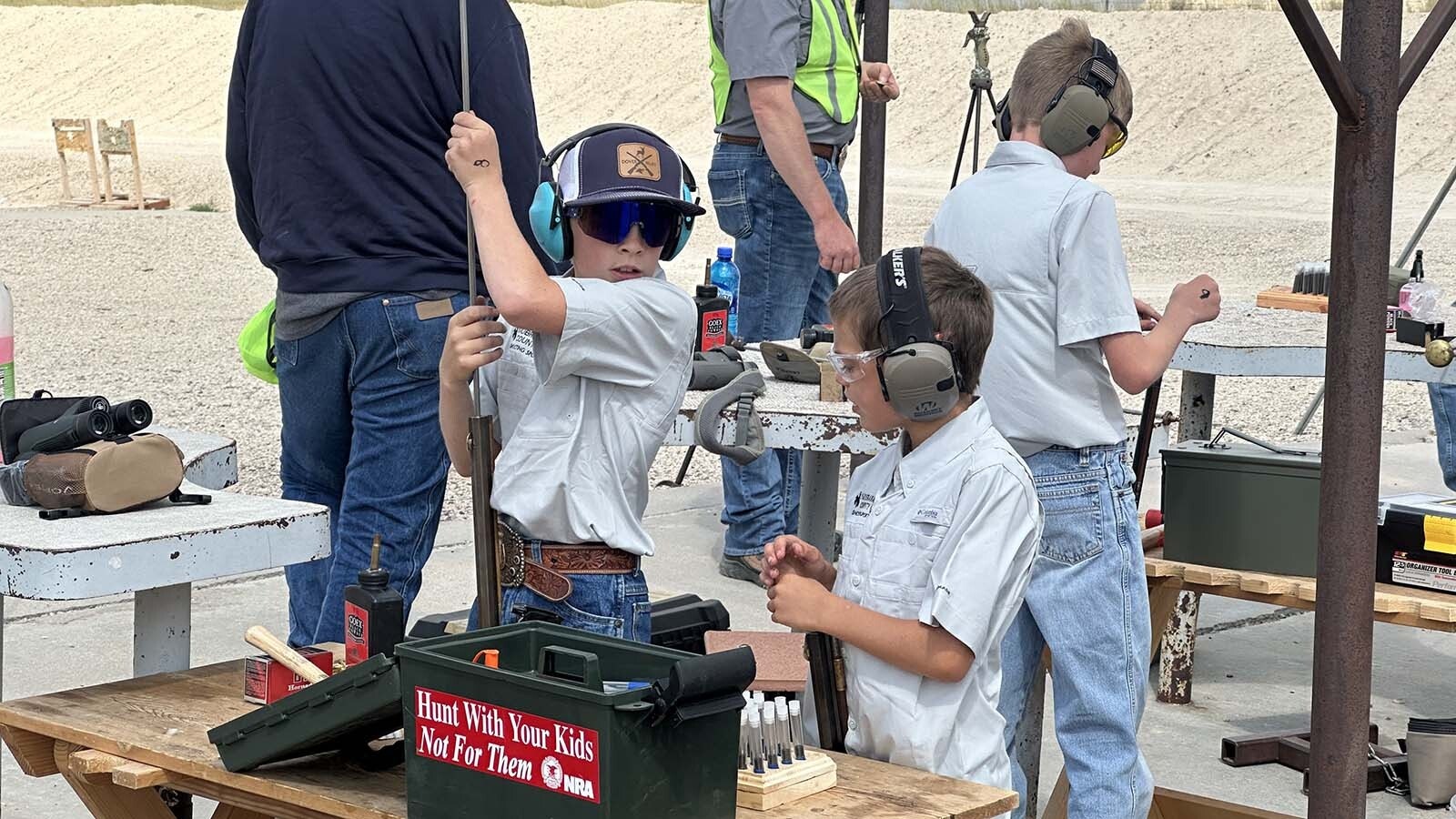The true account of then-Staff Sgt. Drew Dix reads like the script of a high-budget “Rambo” blockbuster.
Assigned to an advisor group, Dix was in the Vietnam city of Chau Phu when it was attacked by battalions of Viet Cong aggressors Jan. 31, 1968.
Over the next 56 hours and under intense enemy fire, Dix rescued 14 civilians, captured 20 Viet Cong prisoners and led excursions to liberate buildings throughout the city.
Inspired by Dix’s heroism, local allied forces rallied counterattacks to fend off the enemy assault.
More than a half-century later, a now-retired U.S. Army Maj. Drew Dix took the podium at the Sublette County Library in Pinedale and addressed a room full of veterans and first responders.
“It is a distinct honor for me to wear this medal for all of you,” Dix said at the luncheon last Tuesday.
For his heroism, Dix was awarded the Congressional Medal of Honor by President Lyndon B. Johnson in 1969. He's one of 62 living MOH recipients and the first enlisted Green Beret to merit one.
“I also remember the people who did what I did, or something greater, but there were no witnesses,” Dix added.
A Medal of Honor recipient must be nominated by someone who witnessed his or her heroic actions.
“I was a lone American until a couple of Navy Seals came along to witness,” he said about the acts that earned him the nation’s highest military honor. “But I think about those who never had a witness, those unknown soldiers who lie forever on a battlefield in a foreign land. Out of ammunition, hand on their knife and they fought to the end. Those are who I wear this medal for.”
Proud To Be An American
Dix was in Pinedale to appear at a handful of engagements. The 79-year-old spoke to area middle school and high school students in the morning and met with the community that evening where he signed copies of his book, “Rescue of River City.”
The decorated war hero was brought to Wyoming through a coordinated effort between a pair of executive directors with a long history of friendship. Robin Schamber runs Sublette BOCES and Karren “Sparky” Turner heads a nonprofit called Center for American Values, which was founded by Dix in 2010.
The Center’s mission to promote patriotism — especially its new K-12 civics-based education initiative — dovetails nicely with Schamber’s latest push to get more community educational programming to Sublette County residents.
“I asked Sparky if she thought Drew would come here,” Schamber explained. “I thought our kids would benefit from seeing what a real hero is. Someone who would fight for their country and be a good role model. Someone who embodies honor, integrity and patriotism.”
Dix could not be more in agreement. Reaching today’s youth while they are still teachable is a key component of what he and his nonprofit are trying to do.
“It’s important for kids to learn it is OK to be patriotic,” Dix said. “It starts with family, then schools. It’s unfortunate the Center for American Values has to get involved in showing kids how to think. Not what to think, but how. It is also unfortunate so many families have shirked that responsibility. Young families can’t be looking to the government to raise their kids.”
The message also rings true for Wyoming Superintendent of Public Instruction Megan Degenfelder. She made the trip to Pinedale in a show of support.
Kids Today
Is it any wonder college campuses are plagued with protests? Or that a divided United States would rather bicker politics on the internet than come together as a nation in any constructive way?
Twenty-five-year-old men still living in their parents’ basement playing Xbox and dodging student loans. Young ladies dutifully glued to Instagram influencers or trying to be one themselves.
Today’s youth hero worship differently than their parents and grandparents. War heroes take a backseat to rappers and sports figures. America and love of country plays second fiddle to, well, almost everything.
But men like Major Dix, who is a bona fide “Jack Reacher” of his time, still enjoy box office clout. And there never was a real-life “Rambo” like this guy.
From Green To Green Beret
Reminiscent of the U.S. Army slogan from the 1980s that, “We do more before 9 a.m. than most people do all day,” at 18 years old, Dix enlisted in the military.
Born at West Point, his father an instructor there, it was a foregone conclusion, perhaps. For as long as Dix could remember, he wanted to be a Green Beret.
Dix asked to join the Special Forces. The recruiter chuckled. They don't put fresh-faced recruits directly into elite special ops, but Dix was assigned to the 82nd Airborne where he saw action in Operation Power Pack, the United States military intervention in the Dominican Republic in 1965.
By the time he was 21, Dix had that Special Forces assignment. After grueling training, he received his green beret and was off to the Mekong Delta in South Vietnam.
With the Vietnam conflict heating up, Dix was attached to a CIA-led super-secret covert operation. It was the kind of clandestine mission that comes with the disclaimer that, if captured, “the government will disavow all knowledge of your existence.”
His job was to infiltrate enemy lines into Cambodia and gather intel on Viet Cong troop movements. When he could, Dix relayed crucial information and captured enemy soldiers or their weaponry.
When not out sneaking around in the jungle, Dix performed his “official role” as military adviser, organizing members of the Army of the Republic of Vietnam (ARVN) and preparing them to defend Chau Phu, capital city of Chau Doc province, with a population of 25,000.
As hotspots of fighting intensified elsewhere in the Vietnam theatre, there was less concern an invasion of Chau Phu was imminent.
That was before the Tet Offensive.
Tet Offensive Changes Everything
Early on the morning of Jan. 31, 1968, more than 85,000 Viet Cong and North Vietnamese forces simultaneously invaded and attacked nearly hundreds of cities in South Vietnam, including Chau Phu near the Cambodia border. No one saw it coming, except maybe Dix.
“I knew something was up,” Dix said. “My business was to go after enemy infrastructure through capture. In the days leading up to [the surprise attack], we just weren’t finding any action. It was strangely quiet. Too quiet.”
Dix was out on patrol with an eight-man team of Navy Seals when word came that Chau Phu was being overrun. The small unit had been upriver for 10 hours, engaging the enemy at one point, when the distress call came in.
“So, you heard over the radio that ...” Cowboy State Daily began asking the major.
“No radio. There were no radios. There were no American units there,” Dix answered, then leaned in close. “We were not technically supposed to be there, you understand?”
Dix would not say how he received word, only that he did, and his unit immediately pointed their 32-foot fiberglass riverboat south and floored it.
When Dix got back to Chau Phu it was worse than he imagined.
He encountered smoke columns rising from buildings and vehicles burning everywhere. Heavily fortified machine gun emplacements were sandbagged and strategically placed at key intersections throughout the city. Searchlights swept the streets as intense small-arms fire rang out on nearly every block.
Military leaders would later describe the situation as “a complete breakdown and fragmentation of the defenses of the city.”
Time for heroes to roll up their sleeves and get to work.
“We had to fight our way back in. It was a little like Normandy,” Dix said.
Rescue Mission
Dix found out a young woman, a nurse named Maggie Frankot (now O’Brien), was trapped in her house. When he and a handful of Navy Seals arrived, the situation looked grim.
“There must have been a thousand bullet holes in her Jeep. Enemy fire flying everywhere. The building was in shambles,” Dix remembered.
Dix says muscle memory takes over. There is no fear, only training.
“You don’t think about things,” he assured, “you just do what needs to be done.”
Dix rescued Frankot and got her safely to a PBR (Patrol Boat, Riverine). But he wasn’t done yet. Even after his Seal team left him, Dix continued to go door-to-door, fighting room-to-room, facing fierce enemy opposition as he rescued eight USAID volunteers, two Filipino workers and a young Vietnamese girl.
“Initially, there were 14 Navy Seals with me. When one of them was killed, they pulled out. They were told it was hopeless and it was. We were overrun with the enemy. Up against two battalions (an estimated 3,000 to 4,000 troops),” Dix said.
After 24 straight hours of fighting, Dix voluntarily led a group of two-dozen Vietnamese provincial reconnaissance unit (PRUs) soldiers back into the heart of the city, where they encountered intense mortar and small-arms fire but succeeded in capturing 20 enemy Viet Cong, including one of the highest-ranked commanders taken prisoner in the Vietnam War.
Dix still wasn’t done.
After two days of fighting, the 24-year-old staff sergeant voluntarily led an assault on the enemy at the local residence of the deputy province chief where his wife and two children had been taken captive. Dix blasted his way into the building and brought all three out unharmed.
Not only was Dix successful in rescuing 14 total United States and free world civilians, he inspired soldiers of the Army of the Republic of Vietnam (ARVN) to fight for their city and take it back.
Together with an estimated 137 PRUs he had personally trained, Dix and his ragtag bunch successfully fought off the invasion even as they were outnumbered 30-1.
Call Of Duty
In all, Dix fought for 56 straight hours. Of the 200 Viet Cong killed in action, the young staff sergeant accounted for 14 confirmed kills and, more likely, 39 in all.
“That’s probably why I received a Medal of Honor because I was there by myself. A couple Seals came back that were not assigned to the original platoon. They stayed for a while and then I lost track of them,” Dix said. “It was chaotic. It was not like a military unit where there is a lot of knowledge of what was happening.”
James N. Tull, a foreign service officer serving as the provincial senior advisor, was one of the eyewitnesses who testified to Congress on Dix’s behalf.
Tull stated, “[Dix] displayed impressive courage and leadership on repeated missions involving great hardship and personal risk in the months preceding the Tet Offensive.”
Tull also noted that during the battle of Chau Phu, “Dix’s conduct was characterized by conspicuous gallantry far above and beyond the call of duty.”
Still today, Dix is never one to glorify war or overstate his role in combat.
“Anyone who has gone to war does not want to go. But we understand we may have to,” he said.
Dix worries the next generation is unprepared to defend their country and uninformed about the costs of doing so. But if the need arises, he is confident there will be those who answer the call.
“The thing is most good deeds come when you are outnumbered and you have to operate from up against a wall. That was my situation in Vietnam,” Dix said.
“If we as a country ever have to do something like that again I hope and trust there will be those that will,” he added. “Because I know there will be those that just won’t get it because they will be looking for someone else to help them.
“But America has always had a proud few that say, ‘Help is not coming, we gotta do this.’ Because there was nobody else to help us [in Vietnam]. Nobody.”
After leaving the military, Dix worked as a security consultant, ran an air service in Alaska, and served as Alaska's deputy commissioner for Homeland Security. Today, he splits his time between Alaska and his family ranch in New Mexico.
Contact Jake Nichols at jake@cowboystatedaily.com.
Jake Nichols can be reached at jake@cowboystatedaily.com.













